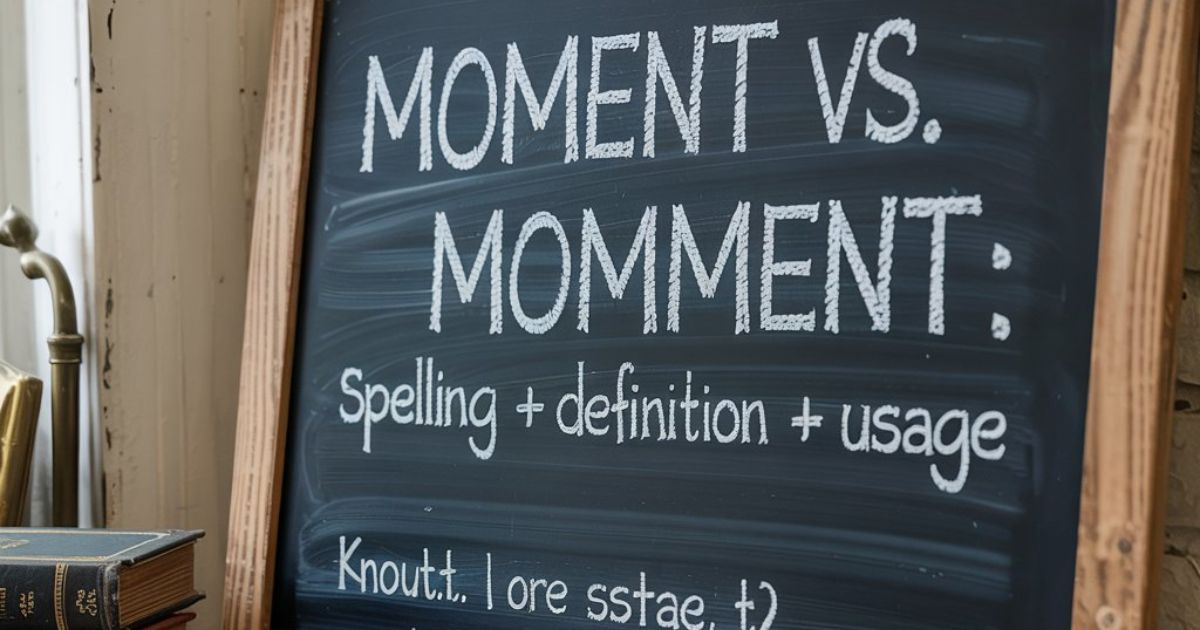When it comes to Moment Vs Momment, it’s essential to know the correct spelling. “Moment” is the proper form, while “momment” is simply a common typo. Although people often mix them up, using the correct spelling of “moment” can make a big difference in clarity. Whether you are writing a quick note or a detailed essay, spelling matters. The confusion between moment and momment may seem small, but it affects how your message is received.
In the Moment Vs Momment debate, always remember that “moment” is the way to go. The extra “m” in “momment” is unnecessary and incorrect. So, next time you write “moment” or “momment,” make sure you choose the right one. Keeping the spelling accurate will ensure your writing stays professional and clear, helping your audience understand your message without any distractions.
Defining “Moment”

A moment refers to a very brief period of time, often highlighting something significant or notable. It can also represent a particular point or event in time that holds importance. Whether it’s a fleeting second, a defining instant, or an impactful experience, a “moment” often carries weight beyond its short duration.
What Does “Moment” Mean?
The term moment is used to describe:
- A brief period of time: A small, precise segment, such as the blink of an eye or a second.
- A significant event or instance: A memorable or pivotal event that stands out in the flow of time, such as a “defining moment.”
- A turning point: In both life and various narratives, a “moment” can symbolize a crucial decision or shift.
- In physics: The term moment refers to the rotational force about a point, defined as a force multiplied by its distance from a rotation point.
Here are some common synonyms for moment:
- Instant
- Second
- Jiffy
- Twinkling
- Flash
- Trice
- Heartbeat
- Minute (when referring to very short periods)
- While
- Point in time
Brief Etymology
The word moment originates from the Latin word “momentum,” which means “movement” or “importance.” It comes from the verb “movere,” meaning “to move.” In the late 14th century, the term moment was used to describe a short period of time, and over time, its meaning expanded to include moments of significance.
Synonyms for “Moment”
Understanding synonyms for a moment can enhance your writing by improving clarity and reducing repetition. Here’s a handy table of synonyms for moment, their meanings, and usage examples:
| Synonym | Meaning | Usage Example |
| Instant | A very brief period of time. | “The car passed in an instant, leaving no trace.” |
| Second | A small, precise unit of time. | “He left the room for a second before returning.” |
| Jiffy | A very short time; often used informally. | “I’ll be back in a jiffy!” |
| Twinkling | The briefest of moments, often associated with light or stars. | “In the twinkling of an eye, everything changed.” |
| Flash | A brief, sudden burst of time or light. | “She left in a flash without saying goodbye.” |
| Trice | A very short time; an instant. | “He disappeared in a trice, leaving us stunned.” |
These synonyms help vary your language, giving your writing a richer and more dynamic flow. Each one has a slightly different Moment Vs Momment nuance, so understanding the context in which to use them is key to making your writing more effective.
Exploring “Momment”
The word “momment” is a common misspelling of the word “moment”. While “moment” is the correct term, many people mistakenly write “momment”, leading to confusion and frustration for both writers and readers. Let’s dive into why this misspelling occurs in Moment Vs Momment and how it relates to the structure of the word.
Why Do People Misspell “Moment” as “Momment”?
There are a few reasons why people tend to misspell “moment” as “momment”:
- Phonetic Similarity: The most common reason is phonetics. When the word moment is spoken, the “m” sound is pronounced with a subtle emphasis, leading some to mistakenly add an extra “m” in the spelling. The pronunciation could lead people to believe that “momment” is the correct form.
- Overgeneralization of Spelling Rules: In English, certain words do have double consonants (like “committee,” “happen,” or “summon”), and some people may overgeneralize this rule, thinking that adding a second “m” is the standard when dealing with words that include an “m” sound.
- Typing Mistakes: As with many common spelling errors, “momment” may simply be the result of a typo. It’s easy to hit an extra “m” when typing quickly, especially on a keyboard where the “m” key is right next to the “n” key.
- Influence of Other Languages: Some non-native English speakers, particularly those whose first language includes words with double consonants, may subconsciously apply similar patterns when writing in English.
The Importance of Accurate Spelling
Spelling plays a crucial role in written communication. While it may seem like a minor detail, accurate spelling can make a big difference in how your message is perceived, understood, and received by others. Let’s explore why spelling matters of Moment Vs Momment and how it influences communication.
Why Does Spelling Matter?
Spelling is crucial for clear communication, and this is especially true when comparing “Moment Vs Momment”. The correct spelling of “moment” ensures your message is understood, while the misspelling “momment” can confuse readers and detract from your professionalism.
Whether you’re discussing a moment in time or reflecting on a significant event, using the right form, “moment”, adds credibility. Misusing “momment” can cause readers to question your attention to detail. Therefore, it’s important to focus on getting “moment or momment” correct in all writing to avoid misinterpretation and maintain clarity in your communication.
Spelling’s Influence on Communication
Consider these two sentences:
- “Embrace the moment.”
- “Embrace the momment.”
The first sentence, using “moment,” is clear and conveys the intended meaning without distraction. However, the second sentence with “momment” introduces a spelling mistake that can confuse the reader and lessen the message’s impact. The incorrect spelling of “momment” from Moment Vs Momment draws attention away from the content, creating a distraction and potentially lowering the credibility of the writer.
When comparing “Moment Vs Momment”, it becomes clear that accurate spelling is vital for effective communication. By using the correct form, “moment” instead of “momment”, you maintain professionalism and ensure that your message is received as intended.
Understanding the Term “Moment” in Context
The word “moment” has various meanings depending on its context. While “moment” generally refers to a brief period of time, it can also represent something more profound, like a turning point or an unforgettable event. Let’s dive into the different ways “moment” is used and explore the importance of understanding the difference between “Moment Vs Momment.”
Different Contexts for “Moment”
- Temporal Context:
At its core, “moment” refers to a short, specific period of time. It’s used when something happens briefly or instantly, such as in the sentence, “I’ll be there in a moment.” The misspelling “momment” would create confusion and disrupt this basic understanding of time. - Philosophical or Reflective Context:
A “moment” can signify a pivotal or transformative point in a person’s life. For instance, “That was a life-changing moment.” In contrast, “momment” would make the sentence appear less professional and could cause the reader to focus on the error rather than the meaning. - Cultural Context:
Certain moments hold cultural importance, such as historical moments or celebrated events. A phrase like “The moment the Berlin Wall fell was historic” captures a significant occasion. Using “momment” here would make the sentence look unpolished, reducing its cultural and emotional impact.
Cultural and Emotional Importance of Moments
When we discuss the “Moment Vs Momment” debate, it’s crucial to understand how proper spelling influences the perception of a moment’s importance. In cultural settings, moments like the first moon landing or major societal milestones define history. Spelling errors such as “momment” can undermine the significance of these events.
Emotionally, the term “moment” is deeply tied to personal experiences. Whether it’s the birth of a child or a moment of personal triumph, these memories are cherished for a lifetime. Using the correct spelling, “moment”, preserves the gravity of these experiences, while errors like “momment” may detract from their emotional weight.
Moment Usage Across Fields
| Field | Example Usage | Impact |
| Temporal (Time) | “I’ll be with you in a moment.” | Clear communication of a short time period. |
| Philosophical | “That was a pivotal moment in his life.” | Emphasizes a transformative or life-changing event. |
| Emotional | “That moment of happiness will stay with me forever.” | Highlights the emotional weight of a personal experience. |
| Cultural | “The moment the Berlin Wall fell was historic.” | Marks a significant historical or cultural milestone. |
| Professional/Workplace | “This is the moment to prove yourself.” | Creates a sense of urgency or importance in a professional context. |
Examples of “Moment” in Sentences
The word “moment” can be used in a variety of contexts, ranging from everyday situations to significant, life-changing events. Below are some examples of “moment” used in different settings to highlight its versatility:
Common Examples of Moments in Different Settings
- “I’ll be with you in a moment.”
- “Please give me a moment to gather my things.”
- “The moment I saw her smile, I knew everything would be okay.”
- “That was a moment I’ll never forget, standing on stage after my first performance.”
- “That moment of realization changed the way I viewed the world.”
Examples of Moments in Specific Contexts
- “The moment the final whistle blew, the team knew they had won the championship.”
- “That was the moment the athlete broke the world record.”
- “This is the moment to prove yourself and show what you’re capable of.”
- “The moment we secured the contract was a major milestone for the company.”
- “The moment scientists discovered penicillin changed the course of medicine.”
The Consequences of Misspelling: “Moment” vs. “Momment”
Misspelling the word Moment Vs Momment can have several negative consequences, ranging from reduced clarity and professionalism to potential impacts in academic, emotional, and social contexts. Let’s explore how the incorrect spelling can affect communication in different areas:
Clarity and Understanding
When “moment” is misspelled as “momment,” the intended message becomes less clear. Readers may pause to figure out if it was a typo or a legitimate word, interrupting the flow of the message. This can lead to confusion and a diminished understanding of the text.
Professionalism and Credibility
In professional and business communication, misspellings can significantly impact your credibility. Using “momment” instead of “moment” can make you appear careless, especially when presenting reports, proposals, or other formal documents. Proper spelling is essential to maintain a professional image.
Academic and Technical Implications
In academic or technical writing, precision is key. Misspelling “moment” as “momment” could affect the clarity of arguments, making it more difficult for readers to focus on the main points. In fields that require rigorous attention to detail, such as research papers or technical manuals, spelling errors could lead to misunderstandings or misinterpretations of critical information.
Emotional and Social Impact
In personal or social contexts, misspellings can have an emotional impact, particularly if the message is meant to convey a significant moment.
Misspellings in Digital Communication
In today’s digital world, where quick messaging is the norm, “momment” is often seen in informal settings like text messages, social media posts, or emails. While minor misspellings in Moment Vs Momment may not always carry serious consequences in casual conversations, frequent errors can affect your reputation in the digital space.
Strategies to Avoid Misspelling “Moment”
- Use Spell Check:
Always use spell-check tools in word processors and browsers to catch mistakes like “momment.” - Read Your Work Aloud:
Reading your text aloud can help you identify awkward phrasing and potential spelling errors. - Know the Common Misspellings:
Recognize that “momment” is a common misspelling and stay aware of it while writing. - Practice Typing:
If you often make this mistake while typing quickly, try practicing typing the word “moment” until it feels more natural.
Related Guide:
What Does ‘El Belicon’ Mean? Exploring the Deep Roots and Impact
Tips for Avoiding Spelling Mistakes
Spelling errors, like confusing “moment” with “momment,” can detract from your writing’s professionalism and clarity. Here are some practical strategies of Moment Vs Momment to help you avoid such mistakes and ensure your spelling is accurate:
Practical Strategies for Correct Spelling
- Use Spell Check Tools:
Make use of built-in spell checkers in word processors and email clients to flag and correct mistakes like “momment.” - Familiarize Yourself with Common Mistakes:
Recognize common spelling errors, such as “momment” instead of “moment,” and make an effort to correct them. - Read Your Writing Aloud:
Slow down and read your work out loud to catch errors like “momment” that might be overlooked during fast writing. - Consult a Dictionary:
Look up words in a dictionary if you’re unsure about their spelling, especially those that are often confused. - Practice with Flashcards:
Create flashcards with tricky words to reinforce correct spelling and definitions.
Quick Tips for Orthography Accuracy
- Focus on Sound-Alike Words:
Pay extra attention to words that sound similar, such as “moment” and “momment,” to avoid confusion. - Use Mnemonic Devices:
Create memory aids to help remember tricky spellings, like associating “moment” with a fleeting event. - Check Your Work Twice:
Always reread your work to spot spelling errors, especially for words like “momment” that are easy to miss. - Break Down Long Words:
Break complex words into smaller parts (e.g., “mo” and “ment” for “moment”) to make spelling easier. - Write Slowly and Mindfully:
Take your time while typing to focus on details and reduce the risk of spelling mistakes.
The Significance of Moments
Moments, though often fleeting, hold immense significance in shaping our lives. From life-changing events to quiet, introspective pauses, the power of Moment Vs Momment lies in their ability to leave lasting impacts on our memories, decisions, and personal growth.
The Power of Moments in Life
Every moment in our lives has the potential to change everything. It’s often said that life can be defined by a single moment, and those moments can be defining in terms of relationships, choices, and personal transformations. The word “momment” might seem like a harmless typo, but it can detract from the gravity of the real moments we experience. A “moment” of clarity, love, or realization can alter the course of our lives forever, and spelling it correctly is part of preserving its true meaning.
Moments and Memory
For instance, the “moment” you meet a lifelong friend or experience an emotional milestone is more than just a passing event, it becomes part of your personal history. If that memory were to be tainted by an error like “momment,” the significance could be undermined. Therefore, the difference between “moment vs. momment” is not just about spelling but about maintaining the integrity of what those moments represent.
Idioms and Expressions Using “Moment”
The word “moment” is often featured in various idioms and expressions that convey particular meanings beyond the literal. These idioms help us communicate more vividly and are commonly used in both casual and professional conversations. Below are some well-known idioms involving “moment” and their contextual meanings.
Common Idioms Involving “Moment”
- “A moment of truth”
- Meaning: A time when the reality of a situation becomes clear, often revealing critical facts or a decision-making point.
- Example: “The moment of truth came when she had to choose between her career and her family.”
- Meaning: A time when the reality of a situation becomes clear, often revealing critical facts or a decision-making point.
- “In the moment”
- Meaning: To be fully present and engaged in the current experience, without thinking about the past or future.
- Example: “She was in the moment at the concert, dancing and singing along to her favorite songs.”
- Meaning: To be fully present and engaged in the current experience, without thinking about the past or future.
- “Just a moment”
- Meaning: A brief period of time, often used to ask someone to wait briefly.
- Example: “Please hold on, I’ll be with you in just a moment.”
- Meaning: A brief period of time, often used to ask someone to wait briefly.
Contextual Meaning in Each Idiom
The contextual meaning of idioms with “moment” changes based on the situation. For example, “a moment of truth” refers to a critical point where reality is revealed, while “in the moment” encourages being fully engaged in the present. “Just a moment” is a brief pause, and a “moment of glory” represents a peak achievement. “The right moment” emphasizes waiting for the perfect time to act. Each idiom highlights a different aspect of time and experience, showing the versatility of the word “moment.”
Catchy Slogans and Phrases with “Moment”
- “Make every moment count.”
- “Seize the moment, live the dream.”
- “Live for the moment, love every second.”
- “In this moment, everything is possible.”
- “Turn every moment into a masterpiece.”
- “A moment of clarity can change everything.”
- “Embrace the moment, cherish the journey.”
Famous Quotes About Moments
- “It’s not the years in your life that count, it’s the life in your years.” – Abraham Lincoln
This quote emphasizes the importance of living each moment to its fullest. - “The best thing about the future is that it comes one day at a time.” – Abraham Lincoln
A reminder that each moment matters, and we should take things one step at a time. - “This moment is all there is.” – Rainer Maria Rilke
A poetic reminder to live fully in the present moment. - “Time flies over us, but leaves its shadow behind.” – Nathaniel Hawthorne
An observation on how moments may pass quickly, but their impact stays with us.
Practical Tips: When and How to Use “Moment” Correctly
The word moment refers to a short period of time or a specific, impactful event. It is essential to use “moment” in the right context to convey the intended meaning. In the Moment Vs Momment discussion, “moment” is the accurate spelling. Incorrect usage like “momment” can reduce the clarity of your message. Whether referring to a quick pause or a life-changing experience, remember that “moment” should be used, not “momment.
Understand the Definition
A moment is a brief period of time, often used to signify a significant event or experience. It’s important to distinguish between “moment” and the misspelled version, “momment.” Using “moment” correctly helps maintain clarity and professionalism in writing. In the Moment Vs Momment debate, the correct form is always “moment”. Whether you’re referring to a fleeting instant or a crucial turning point, always use “moment” to avoid confusion with “momment.”
30 Key Points about “Moment” vs. “Momment”
Understanding the difference between Moment Vs Momment is crucial for clear and accurate communication. Below are 30 essential points to keep in mind when discussing the correct usage of “moment” versus the incorrect “momment.”
1. Moment is the Correct Spelling
“Moment” is the accurate spelling, and using it properly is essential to maintaining clarity in both written and verbal communication.
2. Moment: A Brief Period of Time
A moment is typically a short, specific period of time that holds significance or marks an important event or change.
3. “Momment” is a Typo
“Momment” is not a valid word in English and is considered a typographical error. Always use “moment” instead.
4. Definition of Moment
The term “moment” refers to a brief instance in time, often highlighting an important or memorable event.
5. Etymology of Moment
The word “moment” comes from the Latin word “momentum,” meaning “movement” or “a brief period of time.”
6. The Importance of Spelling
Correct spelling, especially with words like “moment”, ensures that your writing is clear, professional, and credible.
7. Misspellings Cause Confusion
Misspelling “moment” as “momment” can confuse readers and undermine your message’s effectiveness.
8. Emotional Significance
Moments often carry emotional weight, from small personal experiences to significant life-changing events.
9. Professionalism and Credibility
Using “moment” correctly reflects professionalism, while misspelling it as “momment” could damage your credibility.
10. Moment in History
Moments in history are pivotal points that shape the world, such as political events or scientific discoveries.
11. Synonyms for Moment
Some synonyms for “moment” include instant, minute, second, and occasion, depending on context.
12. Impact of Moments
The impact of moments can be profound, influencing decisions, actions, and memories for years to come.
13. Avoiding “Momment”
Avoid using “momment” by remembering that “moment” is the only correct spelling in English.
14. Writing Precision
Using the correct spelling of “moment” ensures your writing is precise, making your point clear and understandable.
15. Examples of “Moment”
Examples of “moment” in sentences could include, “It was a moment of pure joy,” or “That was the defining moment of his life.”
16. Moment in Philosophy
In philosophy, “moment” can refer to an instant in time that carries deep existential or conceptual meaning.
17. Moment in Photography
In photography, a moment captures a fleeting instance, often one that tells a larger story or emotion.
18. Moment in Pop Culture
Moments in pop culture often become iconic, such as memorable quotes, scenes, or performances that stay relevant over time.
19. The Definition of “Momment”
Since “momment” is an incorrect spelling, it does not have a formal definition in the English language.
20. Emotional Moment

Moments of emotion, such as happiness or sorrow, often leave lasting impressions on individuals.
21. Correcting “Momment”
To avoid the misspelling “momment”, remember to double-check your writing for accuracy and use “moment” consistently.
22. Impact of Spelling Errors
Spelling errors like “momment” can distract readers and affect the overall readability of your content.
23. Language Proficiency
Proper spelling of words like “moment” demonstrates strong language proficiency and helps avoid misunderstandings.
24. Moments in Literature
In literature, “moments” are pivotal moments in the plot that shape character development or drive the narrative forward.
25. Misspellings in Digital Communication
Digital communication often leads to quick typing and spelling errors, such as “momment”, which may lower the perceived quality of your writing.
26. The Moment in Sports
In sports, a moment refers to a critical instance, like scoring a winning point or making a game-changing play.
27. Cultural and Psychological Moments
Cultural moments can shape societies, while psychological moments often refer to instances of personal transformation or realization.
28. Grammar Checkers Help
Grammar checkers are useful tools to help identify spelling mistakes like “momment”, ensuring that you always use “moment” correctly.
29. The Importance of Correct Orthography
Proper orthography, such as using “moment” instead of “momment”, helps maintain the credibility and readability of your writing.
30. Cherish the Moment
To cherish the moment means to appreciate the fleeting yet significant periods in life that shape our memories and experiences.
FAQ’s
What is the difference between moment and momment?
From Moment Vs Momment, the extra “m” in “momment” is incorrect. Always use “moment” in your writing to ensure clarity and avoid errors in spelling.
Why do people use “momment” instead of “moment”?
Many mistakenly add an extra “m” when typing quickly. However, the correct spelling is “moment,” as seen in the Moment Vs Momment discussion.
Can “momment” be used in professional writing?
When Moment Vs Momment is Using “momment” instead of “moment” can hurt your credibility. Stick to the correct spelling of “moment” to maintain professionalism in your work.
Is there a historical reason for the confusion?
The confusion between “moment” and “momment” may stem from phonetic similarity. In the Moment Vs Momment debate, remember that “moment” is the right choice.
How can I avoid spelling mistakes with “moment”?
To avoid errors like “momment,” double-check your writing and use grammar checkers. Using the correct spelling is essential in Moment Vs Momment discussions.
Conclusion
In the end, the difference between Moment Vs Momment is clear. “Moment” is the correct spelling, while “momment” is simply a mistake. It’s important to remember that using “moment” instead of “momment” helps maintain clarity and professionalism in your writing. Whether you’re writing a formal document or a casual message, getting the spelling right is crucial.
To wrap up the Moment Vs Momment debate, always use “moment” and avoid the common error of writing “momment.” The extra “m” in “momment” doesn’t belong, and using the wrong form can distract your readers. So, keep your writing clean and clear by sticking with “moment” and ensuring that momment never slips into your work. This small detail makes a big difference in your writing quality and communication.

Ember Rose is a dedicated administrator with 4 years of experience in efficient operations management and team leadership. Skilled in streamlining workflows and enhancing productivity.

